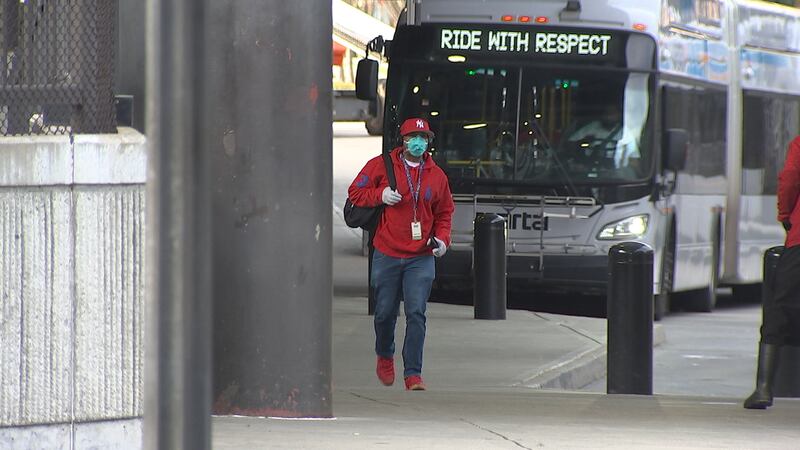ATLANTA — They are the people who keep us going by providing the services we can't live without: essential workers.
With those jobs come demands for more protection and pay as the coronavirus continues to spread throughout the metro area and the country.
Transit workers tell Channel 2 investigative reporter Nicole Carr that federal dollars are not providing a quick fix for all this.
There are now worries about safety concerns, money concerns and how people on the front lines say they need more protection.
[SPECIAL SECTION --> Latest on coronavirus in Georgia and around the world]
“I just didn’t think that was the right thing to do, go in there knowing I was positive,” said nurse Myesha Moore.
Moore worked at an Athens nursing where Channel 2 Action News confirmed 10 people have died from the virus.
Moore came to Channel 2 Action News, frustrated, saying she was fired for refusing to go work because she was scared she was still infected and could spread coronavirus.
In a statement Pruitt Health PruittHealth denies terminating Moore, and said she is still on the payroll and even scheduled to earn hazard pay.
They also said they are restricting staff at Grandview to only essential personnel right now
Video from March 31, shows a MARTA bus packed with people despite social distancing warnings. A security employee told Carr it remains a problem even now.
Another metro Atlanta bus operator said his bosses handed out what looked like a shower curtain to help protect them from the virus.
And while grocery employees work around the clock to keep Atlanta shelves stocked, a concerned employee from an Alpharetta Publix store shares a corporate memo with Carr after a group of employees were ordered to quarantine at home after a co-worker tested positive for the virus.
Finally, Channel 2 Action News recently reported that the U.S. Department of Health and Human Services authorized two elderly patients who had just tested positive for coronavirus to board a commercial flight out of Atlanta.
One of them was showing symptoms, and because it was suspected they were clear of the virus, the flight crew was never notified.
“That is the wrong way to go. We should not be going to the lowest common denominator when lives are at stake,” said Sara Nelson, with the Association of Flight Attendants.
Flight attendants are now asking the FAA for better notification, protective gear and an end to leisure travel.
What happens when you have no choice but to be exposed?
RELATED HEADLINES:
- 10 patients at the same Georgia nursing home die of coronavirus
- Confirmed coronavirus cases jump 1,000+ since last night
- Tyler Perry gives out $21k in tips to out-of-work servers at Atlanta restaurant
“We tried to calculate just how many of these workers are out there and we estimated there could be up to 62 million workers across the country,” said Joe Kane with the Brookings Institute.
And what happens to the people who are called essential employees?
“This is about losing millions of Georgians’ lives. We don’t want bus drivers that we represent to be the ones losing their lives because they’re essential employees just doing the right thing,” said Curtis Howard, international vice president of the Amalgamated Transit Union.
Among the most vocal essential employees in metro Atlanta are bus drivers.
"In other cities, we’ve had several drivers that have passed away. Literally got the virus and passed away, all within the last two weeks," Howard told Carr.
A Detroit bus driver died last week, 11 days after recording a Facebook Live about his experience with a passenger.
"We out here. We moving the city back and forth trying to be professional about what we do," the driver said. “For a grown-ass person in her late 50s, early 60s to stand on a f****** bus and cough four or five times and not cover up her mouth, and you know I am pissed the f*** up.”
“The men and women that have to come to work every day and provide the service are really put in a more hazardous situation because they’re sitting ducks,” Howard said.
Howard worked for MARTA for nearly three decades before becoming international vice president of the Amalgamated Transit union.
Just days ago, he asked Gwinnett transit for $15,000 more in life insurance for his workers, a $4 an hour pay increase and testing for all transit employees.
“We’ve had a group of about 50 operators who have talked about it on dispatch,” Howard said.
The union’s local chapter in Atlanta addressed exposure concerns in an April 2 town hall. They’re also asking MARTA for hazard pay.
“This is not over, right? So, we don’t know the magnitude of what’s happening now,” MARTA CEO Jeff Parker said Monday.
While ridership is down, Parker told Carr that MARTA has a way for bus drivers to call for a backup bus if theirs fills up and there can’t be social distancing.
He said MARTA added rear entry options, ordered protective gear and added stipends for employees to purchase their own if they can’t be distributed quickly enough. They also provided sanitation wipes to employees.
“We’ll be announcing later this week to give employees specific time off if they contract the virus, if they need to take time off if they may have been in contact with someone. All those things,” Parker said.
But when it comes to hazard pay, Parker said the solution an easy one.
“There’s a harsh reality we have to recognize,” Parker said.
Parker said not even $250 million in federal transit funds will prevent layoffs and furloughs because the agency is losing too much in sales tax and revenue.
© 2020 Cox Media Group








